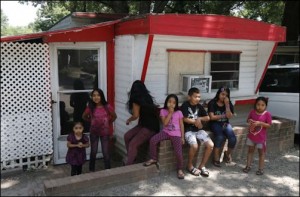by James A. Bacon
A critical but unappreciated contributor to poverty in the United States is the paucity of “social capital” among the poor. Social capital is the term economists use to describe informal knowledge and networks in communities that enable people to collaborate for their mutual benefit and greater good. The term encompasses such intangibles as trust, reciprocity and cooperation. The United States is rich in social capital, at least in the professional and middle classes. Outside of churches, however, America’s poor have little social capital. That lack is both an effect of their poverty and a cause of it.
Poor African-Americans once had significant of social capital when they had cohesive communities, even during the Jim Crow regime of discrimination and segregation. But planners, do-gooders and advocates of “civic progress” did tremendous damage to African-American communities in the post-World War II era through slum clearance programs, the blasting of freeways through their neighborhoods and other state/local government initiatives. It is widely acknowledged by scholars of all ideological stripes that misbegotten social engineering of the 1950s and 1960s not only demolished African-American communities but disrupted important social ties that ameliorated the condition of poverty.
Unfortunately, the current generation of government practitioners appear to be eager to repeat the mistakes of the past. Writing in the Richmond Times-Dispatch, John Moeser and Shay Auerbach, warn that the campaign to “clean up” trailer parks in South Richmond could lead to the physical eviction and social disruption of thousands of poor, in this case, mostly Latinos.
Richmond has nine mobile home parks, all in South Richmond and all along the Jeff Davis, Midlothian and Hull Street corridors. Father Shay Auerbach, one of the authors of this column, is the Catholic pastor of the geographic area where all nine mobile home parks are located and knows well many of the residents of the parks and the social dynamics within their communities.
Most park residents are homeowners; they own their own manufactured houses and rent the lot. Some grow small gardens and, in some cases, raise chickens. Despite their sparse social safety nets, they resourcefully create communities bound by language and extended families that provide mutual support for child care, transportation, illness, loss and security. Connection, community and stability characterize park residents despite their tenuous economic status.
Thousands of energetic and hardworking people want to make Richmond their home. For their children, Richmond is the only home they know. Even the poorest members of this community are willing to work and make short-term sacrifices for their children’s future.
Purchasing an inexpensive manufactured home in a community is a crucial first step up the economic ladder for immigrant families. Whether these new city residents become fully integrated into Richmond life or over time lose hope and find that they have been relegated to a cycle of poverty depends largely on how the wider Richmond community embraces them.
Already, some residents are finding their mobile home communities being dismantled with no plan and very little support. Code enforcement “sweeps” — the building commissioner’s own term — are well underway in two of South Richmond’s mobile home parks and are planned for all nine. Remember, many of these homes are owner-occupied.
Bacon’s bottom line: Since the early 1900s, when the United States first introduced public housing, do-gooders have mistaken material poverty for spiritual (or cultural) poverty. Material poverty reflects a lack of income, a predicament tied to the business cycle and the availability of economic opportunity or the lack thereof. Spiritual/cultural poverty amplifies the challenges of material poverty through single-parent households, teen pregnancies, child neglect and abuse, substance abuse, criminality, dropping out of high school and other notorious challenges often associated with, but not caused by, material poverty.
It appears that the Latino immigrants living in material poverty in South Richmond have brought the resilience of their native cultures with them. They have not yet been fully acculturated to the American way of poverty. They own property. They grow their own vegetables. They collaborate to provide child care and transportation to work. They support one another in ways that the American poor typically do not. Now local authorities, mistaking material poverty for spiritual poverty, seem determined to disrupt these self-supporting communities. If this trailer-camp initiative is not thwarted, we can foretell the disruption of the Latino residents’ resilient culture and their conversion into “real Americans” who depend upon government for their subsistence.



